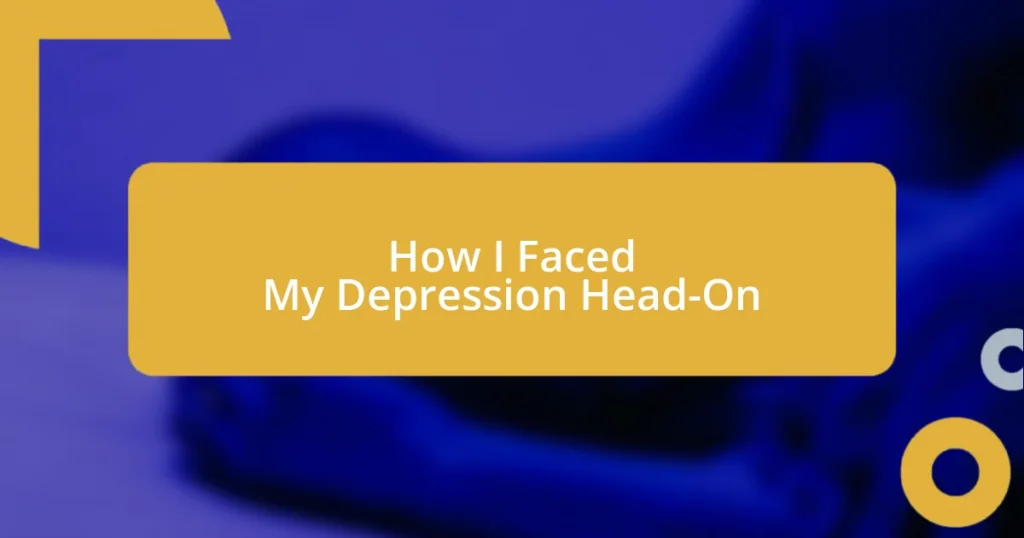Key takeaways:
- Recognizing early signs of depression, such as irritability, sleep disturbances, and loss of interest, is crucial for proactive mental health management.
- Seeking professional help and building a supportive social network significantly aid in the journey of coping with depression, providing understanding and shared experiences.
- Celebrating small victories, tracking progress, and incorporating daily self-care practices, like mindfulness and physical activity, are vital steps toward healing and resilience.
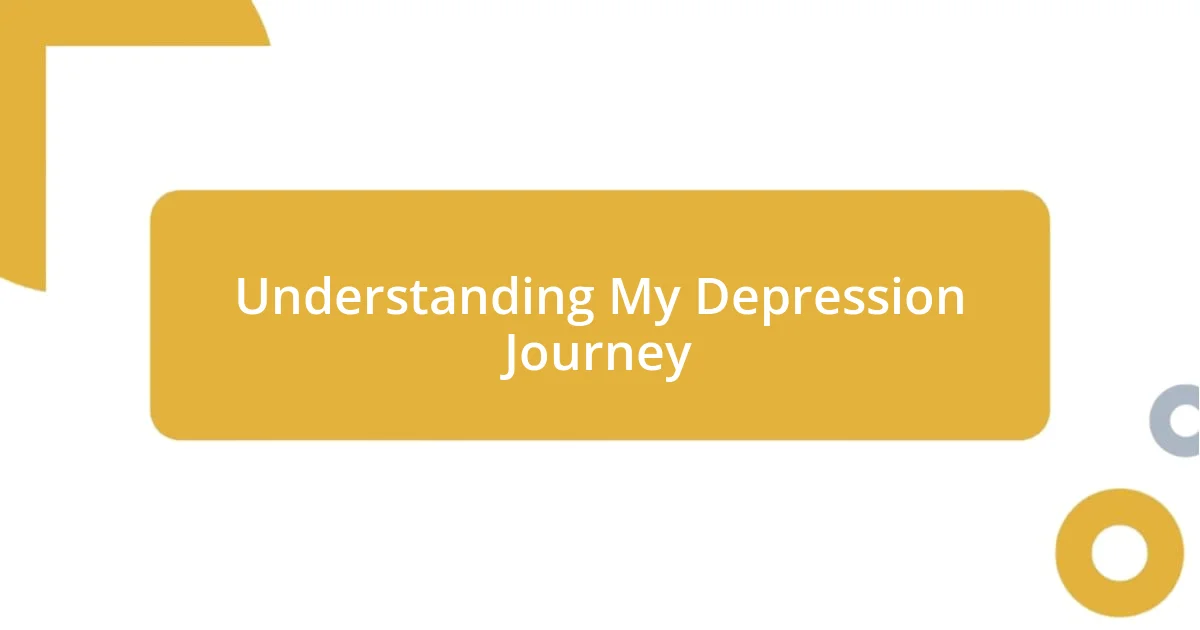
Understanding My Depression Journey
Understanding my depression journey meant facing some uncomfortable truths. I recall sitting in my dimly lit bedroom, feeling like I was encased in a bubble, disconnected from the world around me. Have you ever felt that overwhelming sense of isolation, even when surrounded by friends or family? I often found myself asking, “Why do I feel this way when everything seems fine on the outside?”
As I delved deeper into my emotions, I recognized the patterns that fueled my depression. I had days where the simplest tasks, like getting out of bed or showering, felt insurmountable. I remember one day, I just sat on my bed, staring at the wall, wondering why even the act of self-care felt like climbing a mountain. It was in these moments of despair that I learned the importance of self-compassion and patience with myself.
The journey also brought valuable lessons about vulnerability. I discovered that opening up to a trusted friend about my feelings felt like a significant release. It reminded me of how crucial it is to share our struggles; it shatters the oft-perceived stigma surrounding mental health. Who else has felt lighter after letting their guard down? For me, this connection became a lifeline in my battle against depression.
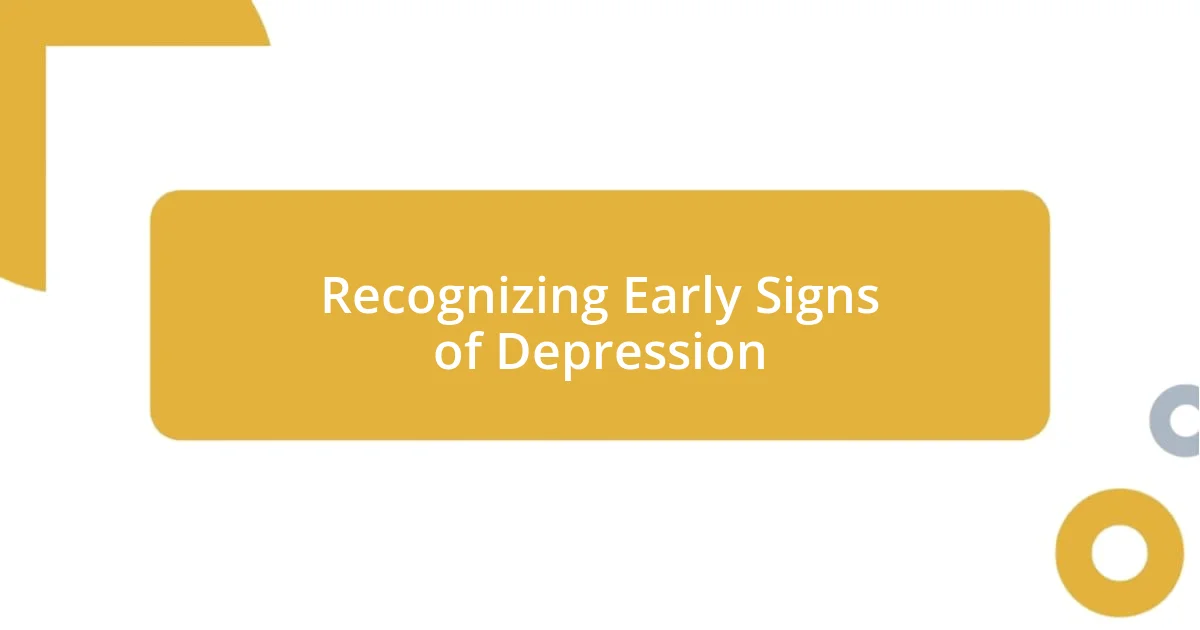
Recognizing Early Signs of Depression
Recognizing early signs of depression can be a nuanced journey, but it’s often marked by subtle shifts in our mood and behavior. For instance, I noticed that I became more irritable over minor issues, a sense that my patience had dwindled. Have you ever felt that snap of anger bubble up unexpectedly? It’s a telltale sign that something deeper may be brewing beneath the surface.
Another key indicator for me was changes in my sleep patterns. I recall lying awake for hours, my mind racing with thoughts that seemed to enlarge the darkness around me. The fatigue that came from restless nights soon morphed into an overwhelming lethargy during the day. It’s vital to pay close attention to these signs, as they often serve as the body’s way of asking for help.
Additionally, I found it challenging to experience joy in activities I once loved, like painting or hiking. This disinterest can feel like a gray veil cast over the vibrant colors of life. These early signs shouldn’t be dismissed; they can signal the onset of something more significant that needs addressing before it spirals. Understanding these feelings is the first step in a proactive approach to managing mental health.
| Early Signs of Depression | Personal Anecdote |
|---|---|
| Increased Irritability | I found myself snapping at friends over trivial matters, which made me realize something wasn’t right. |
| Sleep Disturbances | I often lay awake at night, replaying my day, which contributed to daytime fatigue. |
| Loss of Interest | Activities like painting that once brought joy felt pointless, creating a sense of emptiness. |

Seeking Professional Help and Support
Seeking professional help was a crucial turning point in my journey. At first, the idea of sitting down with a therapist felt daunting. It made me think of vulnerability, and I worried about what I might reveal. But once I took that step, I was met with understanding and compassion. I remember the first session vividly; it was as if a weight was lifted off my shoulders. Sharing my thoughts in a safe space was empowering, and I realized how therapeutic it can be to express yourself without judgment.
When considering professional help, it’s essential to know what kind of support you might need. Below are a few options that could resonate with you:
- Therapy: Individual or group therapy can provide tailored support and tools for managing feelings.
- Counseling: A counselor can help you navigate life challenges and offer coping strategies.
- Support Groups: Connecting with others who share similar experiences can create a sense of community and understanding.
- Psychiatric Support: If medication is a consideration, a psychiatrist can evaluate your needs and prescribe appropriate treatment.
- Crisis Hotlines: If you ever feel overwhelmed, hotlines offer immediate and anonymous support.
Each of these paths offers its own unique benefits, and finding the right fit can make all the difference. Reaching out for help doesn’t make you weak; in fact, it takes tremendous strength to acknowledge when you need support.
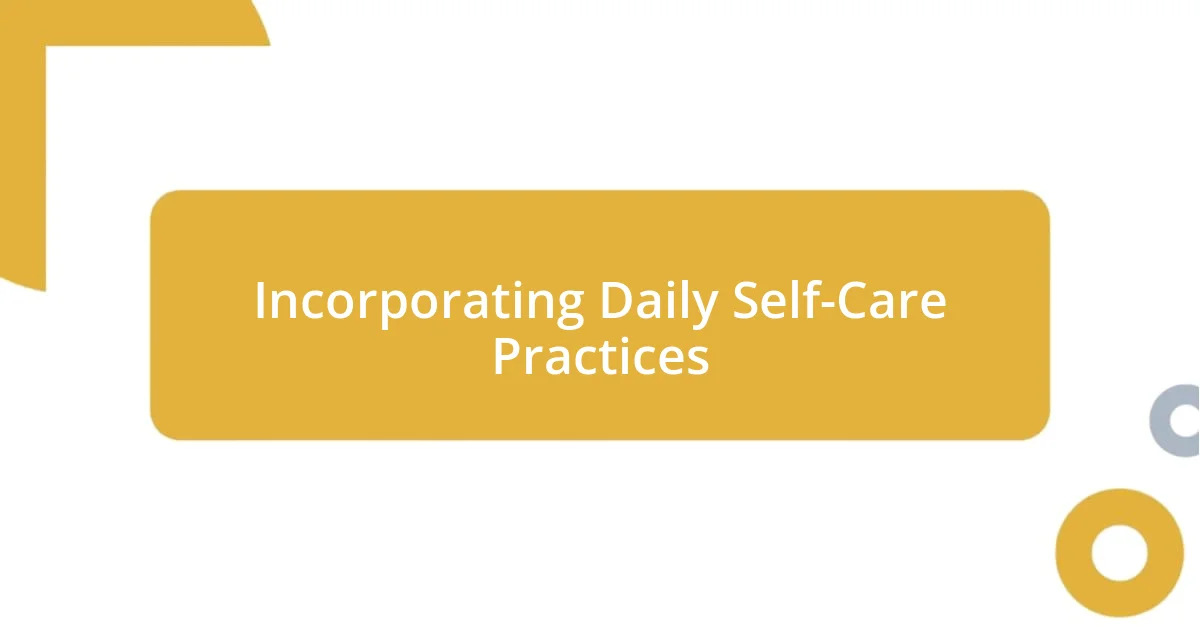
Incorporating Daily Self-Care Practices
Incorporating daily self-care practices became a lifeline for me during my battle with depression. I remember those mornings when I’d drag myself out of bed, feeling the weight of the world on my shoulders. It was often tempting to skip breakfast, but I found that nourishing my body with a simple meal, like oatmeal topped with fresh fruit, provided me with a sense of accomplishment to start the day. Isn’t it fascinating how even small rituals can shape our mood?
Engaging in regular physical activity was another essential practice I embraced. I specifically recall one day deciding to take a brisk walk in my neighborhood. The brisk air and the rhythm of my feet on the pavement lifted my spirits, even if just a bit. It made me realize how our bodies crave movement, and that connection can remind us of our vitality. Have you ever felt that burst of energy after a walk? It’s remarkable how our bodies and minds are intertwined.
Additionally, I found solace in mindfulness and meditation. Setting aside just five minutes each day to breathe deeply and center myself created a space of tranquility amidst the chaos. Sometimes, it was challenging to maintain consistency, but I discovered that even on the tough days, practicing gratitude—like acknowledging one thing I appreciated about myself—served as a gentle reminder of my worth. What little practices have you found uplifting? Embracing self-care can be a powerful step toward healing, and it’s about finding what resonates with you personally.
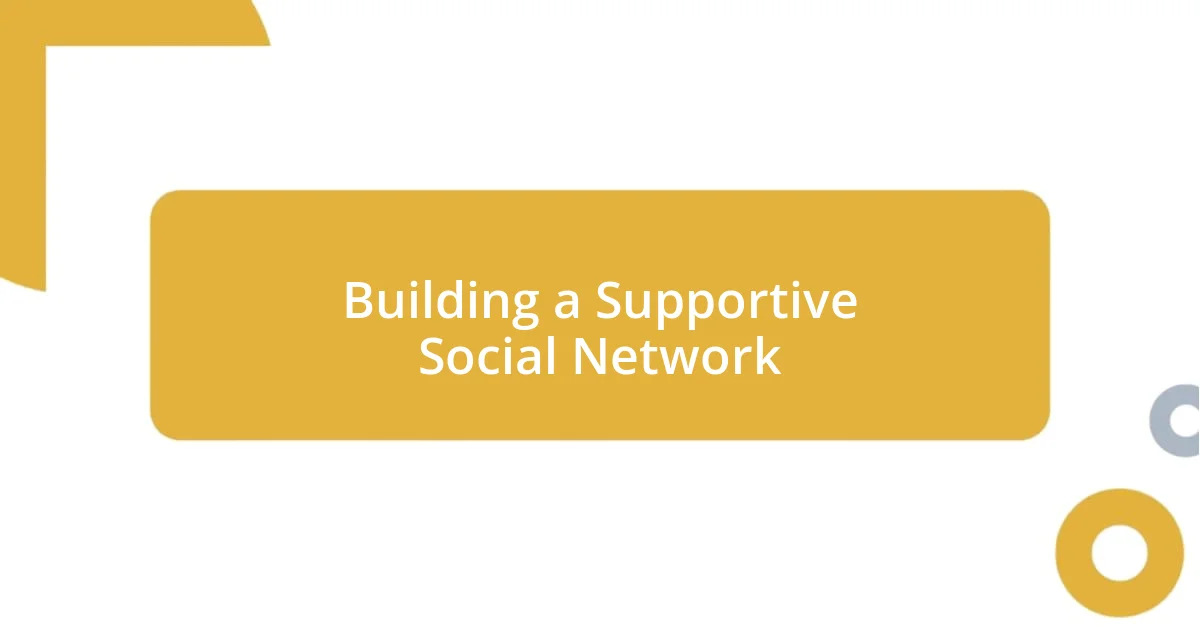
Building a Supportive Social Network
I learned early on that building a supportive social network can significantly ease the burden of depression. For instance, I used to think I had to face my struggles alone, but reaching out to friends and family changed everything. I remember one night, feeling particularly low, I sent a simple message to a close friend. To my surprise, she invited me over for tea and a chat. That evening of connection reminded me how essential it is to have people around who care—those little gestures can mean the world.
During my journey, I also stumbled upon the magic of sharing my experiences with others facing similar challenges. I joined an online support group, and it was eye-opening. I remember feeling a wave of relief to see others openly discuss their feelings and fears—the camaraderie we built helped me feel less lonely in my battle. Have you ever experienced that comforting sense of understanding when talking to someone who just gets it? I found that knowing others were navigating the same waters made all the difference in my ability to cope.
Creating a network isn’t solely about sharing pain; it’s also about celebrating small wins together. I started inviting friends for regular catch-ups, and these meetups brightened my spirits tremendously. Whether it was watching movies, trying new recipes, or simply laughing over silly stories, those moments became anchors in my week. Isn’t it amazing how the power of community can uplift us when we least expect it? Fostering genuine connections has not only strengthened my support system but has also filled my life with joy and purpose, crucial elements in the fight against depression.

Exploring Therapeutic Techniques and Strategies
Exploring therapeutic techniques became my own laboratory for personal growth and healing. I vividly recall my first therapy session; I walked in feeling vulnerable but left with a sense of empowerment. It was eye-opening to discuss my feelings with someone who listened without judgment. Have you ever felt that cathartic release when finally expressing what’s been bottled up inside? That moment was a turning point, helping me understand that sharing my experiences could lift some of the heaviness off my shoulders.
I also discovered the power of journaling as a therapeutic tool. At first, putting pen to paper felt awkward, but I soon realized it was an effective way to process my emotions. I remember sitting on my bed late one night, scribbling down everything swirling in my mind; it was like letting steam escape from a pressure cooker. The clarity I found in those moments was astonishing. Have you tried writing your thoughts down? It can be a simple yet transformative act, allowing us to confront our feelings rather than suppress them.
Art therapy became another outlet I eagerly explored, painting my emotions in hues of blues and reds. One afternoon, while splashing colors on a canvas, I felt a sense of freedom I hadn’t experienced in ages. The act itself wasn’t about creating a masterpiece but rather liberating my inner chaos onto the canvas. I remember stepping back, looking at the mess of colors, and realizing that was my truth at that moment. It struck me—how often do we forget that expressing ourselves doesn’t have to be perfect? Engaging in these creative processes not only helped me reflect but also connected me to a deeper part of myself. What creative outlets resonate with your spirit?
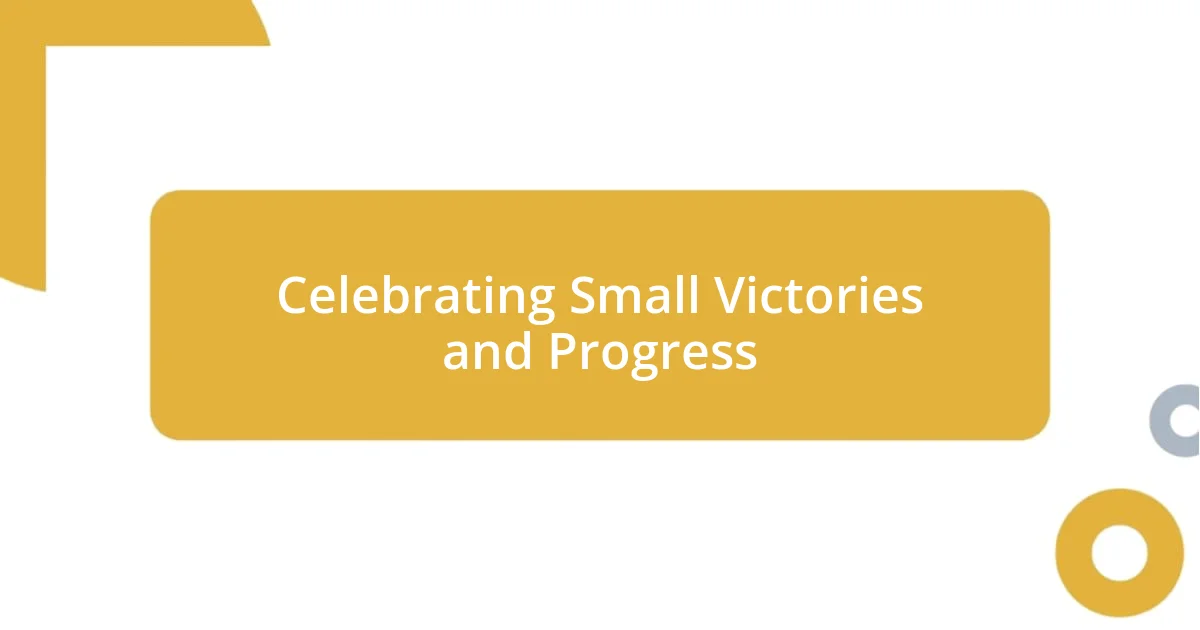
Celebrating Small Victories and Progress
Celebrating small victories has been a crucial aspect of my journey through depression. I remember the first day I managed to get out of bed and take a shower after weeks of feeling paralyzed. It felt monumental, and I couldn’t help but share this triumph with my therapist. She smiled and remarked, “That’s a big deal!” This simple acknowledgment made me realize how often we overlook small achievements, when in reality, they are the stepping stones to larger progress.
I also found that tracking my small wins in a journal became a wonderful practice. Each week, I would jot down little things—like cooking a meal or taking a short walk outside. There was something incredibly satisfying about seeing my list grow. It was a mix of relief and pride, reminding me that recovery isn’t always about sweeping changes; it’s about those quiet yet significant moments. Have you ever reflected on what a simple act can mean for your overall well-being? For me, those entries became a testament to my resilience.
And then there were the days when I celebrated with my friends. One weekend, I invited a couple over for brunch, something that felt daunting at first. When they arrived and we laughed over burn toast and spilled coffee, it created an atmosphere of warmth and connection. Those small gatherings reminded me that life is made up of little joys, and each one matters—even the messy ones. Have you experienced the joy of sharing your progress with loved ones? It’s that kind of support that keeps the spark alive when the journey feels heavy.










